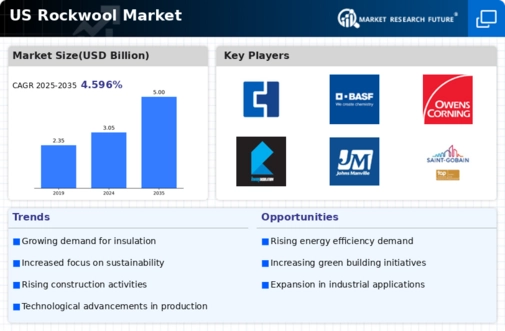Regulatory Support
The US rockwool market benefits from a robust regulatory framework that promotes the use of fire-resistant and energy-efficient materials in construction. Building codes and regulations, such as the International Building Code (IBC), mandate the use of non-combustible materials in certain applications, thereby enhancing the demand for rockwool insulation. Additionally, federal and state-level initiatives aimed at reducing greenhouse gas emissions and improving energy efficiency further bolster the market. For instance, the Energy Policy Act encourages the adoption of energy-efficient building practices, which often include the use of rockwool products. This regulatory support not only drives demand but also fosters innovation within the US rockwool market, as manufacturers strive to meet evolving standards and consumer expectations.
Sustainability Focus
The US rockwool market is experiencing a notable shift towards sustainability, driven by increasing consumer awareness and demand for eco-friendly building materials. Rockwool, being a natural product made from volcanic rock, offers excellent thermal insulation and fire resistance, which aligns with the growing emphasis on energy efficiency in construction. According to the US Department of Energy, buildings account for approximately 40% of total energy consumption, prompting a push for materials that enhance energy performance. This trend is further supported by various green building certifications, such as LEED, which encourage the use of sustainable materials. As a result, manufacturers in the US rockwool market are investing in sustainable production processes and promoting the environmental benefits of rockwool, potentially leading to increased market share and consumer preference.
Growing Construction Sector
The US rockwool market is poised for growth, largely due to the expansion of the construction sector. As urbanization continues to rise, there is an increasing demand for residential and commercial buildings, which in turn drives the need for effective insulation solutions. The US Census Bureau reports that construction spending has consistently increased, with a notable rise in residential construction projects. This trend is expected to continue, as the government invests in infrastructure and housing initiatives. Consequently, the demand for rockwool insulation, known for its thermal efficiency and fire resistance, is likely to surge. This growth in the construction sector presents a significant opportunity for the US rockwool market to capitalize on the increasing need for sustainable and high-performance building materials.
Innovation in Product Development
Innovation plays a crucial role in shaping the US rockwool market, as manufacturers continuously seek to enhance product performance and expand applications. Recent advancements in technology have led to the development of high-density rockwool products that offer superior thermal and acoustic insulation properties. Furthermore, the introduction of lightweight rockwool solutions has made it easier for builders to incorporate these materials into various construction projects. According to the US Geological Survey, the demand for rockwool is projected to grow at a compound annual growth rate (CAGR) of 5% through 2028, driven by innovations that cater to diverse market needs. This focus on product development not only strengthens the competitive landscape of the US rockwool market but also positions it favorably in the broader insulation market.
Rising Awareness of Health and Safety
The US rockwool market is witnessing a heightened awareness of health and safety standards among consumers and builders. As concerns regarding indoor air quality and fire safety become more prevalent, the demand for non-toxic and fire-resistant insulation materials is increasing. Rockwool insulation is recognized for its ability to resist fire and does not emit harmful gases, making it a preferred choice for health-conscious consumers. The Environmental Protection Agency (EPA) emphasizes the importance of using safe building materials to protect occupants' health. This growing awareness is likely to drive the adoption of rockwool products in both residential and commercial applications, thereby enhancing the market position of the US rockwool market.

















